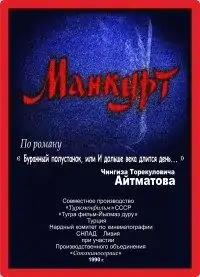Mankurt (film)
Mankurt (Russian: Манкурт; Turkish: Gün Uzar Yüzyil Olur)[1] is a 1990 Soviet film written by Mariya Urmadova[2] and directed by Hojaguly Narliyev.[3] The main cast were the Turkish actors Tarık Tarcan and Yılmaz Duru and the Turkmen actors Maya-Gozel Aymedova and Hojadurdy Narliyev.[4][5][6][7][8][9]
| Mankurt | |
|---|---|
 Russian poster | |
| Turkmen | Mankurt |
| Directed by | Hojaguly Narliyev |
| Written by | Mariya Urmadova |
| Based on | The Day Lasts More Than a Hundred Years by Chinghiz Aitmatov |
| Starring | Tarık Tarcan Maya-Gozel Aymedova Yılmaz Duru Hojadurdy Narliyev Maysa Almazova |
| Cinematography | Nurtay Borbiyev |
| Music by | Rejep Rejepov |
Production companies | Turkmenfilm; Tugra Film |
Release date | 1990 (Soviet Union) |
Running time | 86 minutes |
| Countries | Soviet Union Turkey Libya |
| Languages | Turkmen Russian Turkish |
Background
The film was partially filmed on location in Syria and in Turkey, representing a Turkish-Soviet cooperation in filmmaking.[10] The film is based on a narrative strand within the novel The Day Lasts More Than a Hundred Years ("И дольше века длится день") by Chinghiz Aitmatov,[11] a philosophical tale about what can happen to people if they forget their motherland, language, and history.[3] The Turkic legend mentioned in the novel conceives of a cruel way of making mankurts of captives in the hopes that they will forget everything but basic activities, rendering them servile minions to Zunghar conquerors.
Synopsis
The film is about a Turkmenian who defends his homeland from invasion. He is captured, tortured, and brainwashed into serving his homeland's conquerors. He is so completely turned that he kills his mother when she attempts to rescue him from captivity.
Cast
- Maya-Gozel Aymedova
- Nurberdi Allaberdiyev
- Maysa Almazova
- Baba Annanov
- Kerim Annanov
- Yılmaz Duru
- Altyn Hojayeva
- Hommat Myllyk
- Hojadurdy Narliyev
- Tahyr Narliyev
- Mergen Niyazov
- Maya Nuryagdiyeva
- Sapar Odayev
- Tarık Tarcan
See also
References
- Oliver Leaman (2001). Companion encyclopedia of Middle Eastern and North African film. Taylor & Francis. p. 17. ISBN 9780415187039.
- Grzegorz Balski (1992). "Directory of Eastern European film-makers and films, 1945-1991". Flicks Books.
{{cite web}}: Missing or empty|url=(help) - P. Rollberg (2009). Historical dictionary of Russian and Soviet cinema. Scarecrow Press. pp. 35, 37, 482. ISBN 9780810860728.
- staff (August 18, 1988). "DR. MUSTAFA ÇETİN,FUAT UZKINAY,CENGİZ DAĞCI,CENGİZ AYTMATOV KÖLE". Kultur Sanat (in Turkish). pp. 66, 67. Archived from the original on 27 July 2011. Retrieved 9 February 2011.
- staff (August 17, 1988). "DR. MUSTAFA ÇETİN,FUAT UZKINAY,CENGİZ DAĞCI,CENGİZ AYTMATOV KÜLTÜR". mustafacetin.org (in Turkish). pp. 66, 67. Archived from the original on 27 July 2011. Retrieved 9 February 2011.
- staff (October 2, 1987). "GÜN UZAR YÜZYIL OLUR FİLM OLUYOR,YENİ DÜŞÜNCE". mustafacetin.org (in Turkish). Archived from the original on 27 July 2011. Retrieved 9 February 2011.
- "MANKURT -BIRD MEMORY,"MANKURT" FİLMİNİN SİNOPSİS VE TANITIMI,SD". mustafacetin.org (in Turkish, English, and French). February 2, 1988. Archived from the original on 27 July 2011. Retrieved 9 February 2011.
- "SİNEMADA TÜRK-SOVYET İŞBİRLİĞİ,MİLLİYET". mustafacetin.org (in Turkish). October 2, 1988. Archived from the original on 27 July 2011. Retrieved 9 February 2011.
- "Mankurt (1990)". AMC. Retrieved 2011-02-21.
- "KHODZHAKULI NARLIEV". aytmatov.org. Archived from the original on 2013-04-14. Retrieved 2011-02-21.
- Andrew Horton, Michael Brashinsky (1992). The zero hour: glasnost and Soviet cinema in transition. Princeton University Press. pp. 16, 17. ISBN 9780691019208.